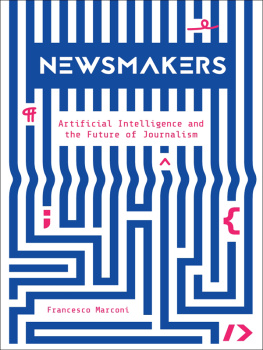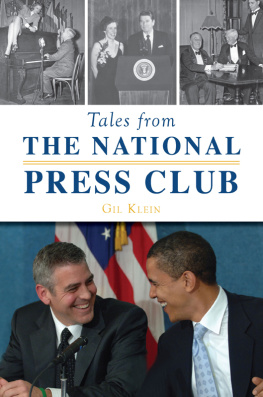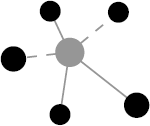Table of Contents
NEWSMAKERS
NEWSMAKERS
ARTIFICIAL INTELLIGENCE AND THE FUTURE OF JOURNALISM
Francesco Marconi
Columbia University Press
New York
Columbia University Press
Publishers Since 1893
New York Chichester, West Sussex
cup.columbia.edu
Copyright 2020 Columbia University Press
All rights reserved
EISBN: 978-0-231-54935-6
Library of Congress Cataloging-in-Publication Data
Names: Marconi, Francesco, author.
Title: Newsmakers : artificial intelligence and the future of journalism / Francesco Marconi.
Description: New York : Columbia University Press, 2020. | Includes bibliographical references and index.
Identifiers: LCCN 2019028576 (print) | LCCN 2019028577 (ebook) | ISBN 9780231191364 (cloth) | ISBN 9780231191371 (paperback) | ISBN 9780231549356 (ebook)
Subjects: LCSH: JournalismTechnological innovations. | Artificial intelligence.
Classification: LCC PN4784.T34 M35 2020 (print) | LCC PN4784.T34 (ebook) DDC 070.4/3dc23
LC record available at https://lccn.loc.gov/2019028576
LC ebook record available at https://lccn.loc.gov/2019028577
A Columbia University Press E-book.
CUP would be pleased to hear about your reading experience with this e-book at .
Book design by Tammy Lian
For my parents and my wife.
CONTENTS
Recent advancements in technology have created a journalism landscape calling for faster news from more responsive newsrooms. In this environment, new processes and workflows are crucial if news organizations want the coming wave of artificial intelligence (AI) to help and not hinder journalism.
Artificial intelligence is here to stay, and it is likely to catapult humanity into a new era. In broad terms, AI refers to smart machines that learn from experience and perform humanlike tasks. More data combined with increased computing power will lead us to a new level of understanding about the world and our immediate surroundings.
Beyond changing society, artificial intelligence will alter how whole economies operate. Consulting firm PricewaterhouseCoopers estimates that by 2030 AI will potentially contribute $15.7 trillion to the global economy, with all regions across the globe expected to see a lift in their GDP as a direct result.
Although some industries, such as communications, automotive production, and financial services, are already heavily investing in AI, the technology itself is still in a very early stage of development. The revolution propelled by smart machines will make some companies highly profitable, while putting others at risk of going out of business. Without proper knowledge and technical resources, no single organization can address the disruption ahead.
Now is the time to lay the foundations for successful change. For the news industry, that means rethinking how news is sourced and relayed to audiences. The result, AI-powered journalism, will require new levels of editorial and institutional oversight.
Smaller newsrooms, in particular, are at great risk of falling behind if they dont make artificial intelligence a key element in their transformation road mapand this will not require a big financial commitment, but it will require increased attention to training and culture change.
This book analyzes the challenges and opportunities of AI through detailed case studies, including newsrooms using algorithms to automatically produce stories, investigative reporters analyzing large sets of public data, and outlets dynamically determining the distribution of content across platforms.
The main message in Newsmakers is that AI can augmentnot automatethe industry, allowing journalists to break more news more quickly while simultaneously freeing up their time for deeper analysis.
Whether you are a seasoned editor, a freelance journalist, or someone just out of J-school, my goal is to provide clarity and a practical road map for how AI can best serve news professionals. With technology costs lowering, smart software is now accessible to just about anyone. Soon, the majority of tools and processes across newsrooms will be powered by artificial intelligence.
In todays nascent model of twenty-first-century news media, editors are not only journalists but information officers, who must be perpetually responsive to new audience needs, develop different story formats, and explore multiple distribution points, all while keeping an eye on emerging technologies that affect how news is produced and consumed. This is why journalists must adopt a more iterative form of their craft, one that leverages new technologies in order to respond in real time to the rapidly changing information needs of readers.
Iterative journalism is not simply about experimentation or being broadly open to new ideas. Its a responsive process informed by data that enables organizations to be driven by new technology, but not defined by it.
In this way and others, Newsmakers is not just another read on how to bring innovation or emerging technology into journalism. I should know. Ive spent years implementing new processes in newsrooms: as an AI co-lead at the Associated Press and as the Wall Street Journals first research and development chief, leading a team of technologists, data scientists, and editors.
Unlike the distanced view youll get from many manuals, what you are about to read is grounded in the field and practice of journalism. It outlines tested strategies, tools, and technologies through examples involving a not-so-distant-future version of a journalist Im calling the Newsmaker, accompanied by best practices, failed experiments, and actionable approaches.
The information in this book explains how journalists at all seniority levels and newsrooms of all sizes (not just the big ones!) can integrate AI into their day-to-day work.
Newsmakers exist in every news organization. They are purpose-driven and eager to try new ideas; they look outside the newsroom for solutions and embrace collaboration. Most importantly, they are not afraid of failure. Each failure to them is a test, each test a step in the transformation of their newsrooms.
Using the Newsmaker as a model, this book cuts through the noise of news innovation clichs. Its tips are the byproducts of a process of trial and error, real applications, and media research. The discussion is conceptual rather than technical, and brevity (not intricacy) is the soul of it. This is not about what to do. Its about how to thinkabout journalism and the very future of the industry.
In three parts, this manual describes the probleman industry in transitionand the solutions, including the artificial intelligence tools and technologies reinventing newsroom processes and finally, a workflow model for iterative journalism.
A network graph of this book shows the terms mentioned with the highest frequency in proximity to one another. For example, every time the word news is mentioned, theres a high likelihood the terms story, consumers, and organizations also appear in the same sentence.
Most frequent words in the corpus: news (185); new (153); AI (139); newsmaker (122); data (114); journalism (112); story (79); journalists (77); content (72); technology (71); media (66); stories (63); newsroom (62); process (62).






